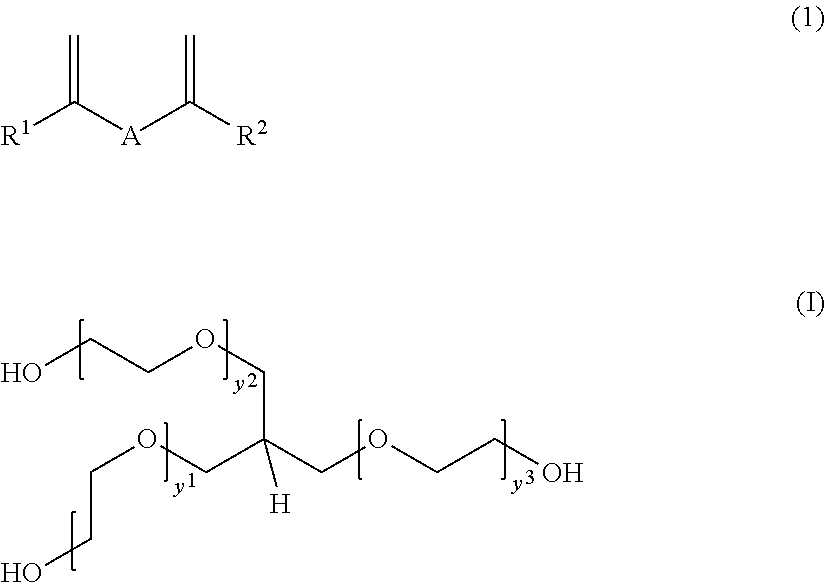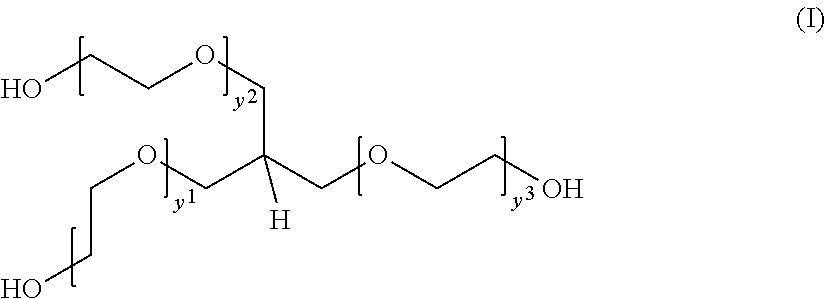Rubber composition for tire, and pneumatic tire
- Summary
- Abstract
- Description
- Claims
- Application Information
AI Technical Summary
Benefits of technology
Problems solved by technology
Method used
Image
Examples
production example 1
(Preparation of Polymerization Initiator)
[0123]To a 100 ml pressure-resistant vessel in which the air was sufficiently replaced with nitrogen was added 10 ml of a hexane solution of 1,3-divinylbenzene (1.6 M). To the mixture, 20 ml of a hexane solution of n-butyllithium (1.6 M) was dropwise added at 0° C. and the resulting mixture was stirred for one hour. Thus, a polymerization initiator solution was prepared.
production example 2
[0124](Preparation of diene polymer 1 (Modified diene polymer))
[0125]To a 1000 ml pressure-resistant vessel in which the air was sufficiently replaced with nitrogen were added 600 ml of cyclohexane, 0.12 mol of styrene, 0.8 mol of 1,3-butadiene, and 0.7 mmol of N,N,N′,N′-tetramethylethylenediamine. To the mixture, 1.5 ml of the polymerization initiator solution prepared in Production Example 1 was further added, and the resulting mixture was stirred at 40° C. After three hours, 1.0 mmol of tetraglycidyl-1,3-bisaminomethylcyclohexane (a modifying agent) was added thereto and the mixture was then stirred. After one hour, 3 ml of isopropanol was added to terminate the polymerization. After adding 1 g of 2,6-tert-butyl-p-cresol to the reaction solution, the solution was subjected to reprecipitation with methanol, and the precipitate was heated and dried to give a diene polymer 1 (modified diene polymer having two or more modified sites (e.g. modified chain ends)).
production example 3
[0126](Preparation of diene polymer 2 (Modified diene polymer))
[0127]To a 1000 ml pressure-resistant vessel in which the air was sufficiently replaced with nitrogen were added 600 ml of cyclohexane, 0.12 mol of styrene, 0.8 mol of 1,3-butadiene, and 0.7 mmol of N,N,N′,N′-tetramethylethylenediamine. To the mixture, 1.5 ml of the polymerization initiator solution prepared in Production Example 1 was further added, and the resulting mixture was stirred at 40° C. After three hours, 1.0 mmol of dimethylaminopropyltrimethoxysilane (a modifying agent) was added thereto and the mixture was then stirred. After one hour, 3 ml of isopropanol was added to terminate the polymerization. After adding 1 g of 2,6-tert-butyl-p-cresol to the reaction solution, the solution was subjected to reprecipitation with methanol, and the precipitate was heated and dried to give a diene polymer 2 (modified diene polymer having two or more modified sites (e.g. modified chain ends)).
[0128]The thus prepared diene p...
PUM
| Property | Measurement | Unit |
|---|---|---|
| Percent by mass | aaaaa | aaaaa |
| Percent by mass | aaaaa | aaaaa |
| Specific surface area | aaaaa | aaaaa |
Abstract
Description
Claims
Application Information
 Login to View More
Login to View More - R&D
- Intellectual Property
- Life Sciences
- Materials
- Tech Scout
- Unparalleled Data Quality
- Higher Quality Content
- 60% Fewer Hallucinations
Browse by: Latest US Patents, China's latest patents, Technical Efficacy Thesaurus, Application Domain, Technology Topic, Popular Technical Reports.
© 2025 PatSnap. All rights reserved.Legal|Privacy policy|Modern Slavery Act Transparency Statement|Sitemap|About US| Contact US: help@patsnap.com



